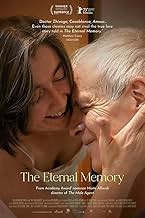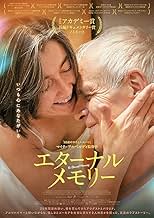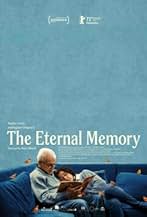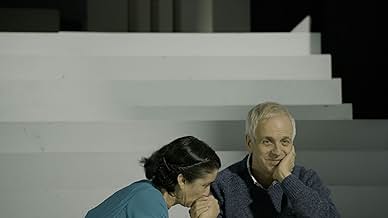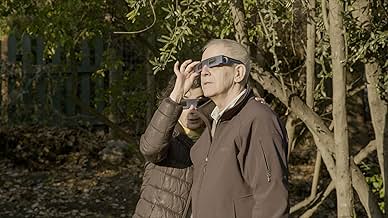IMDb RATING
7.4/10
3.9K
YOUR RATING
Augusto and Paulina have been together for 25 years. Eight years ago, he was diagnosed with Alzheimer's disease. Both fear the day he no longer recognizes her.Augusto and Paulina have been together for 25 years. Eight years ago, he was diagnosed with Alzheimer's disease. Both fear the day he no longer recognizes her.Augusto and Paulina have been together for 25 years. Eight years ago, he was diagnosed with Alzheimer's disease. Both fear the day he no longer recognizes her.
- Nominated for 1 Oscar
- 14 wins & 27 nominations total
Gustavo Cerati
- Self
- (archive footage)
Pedro Lemebel
- Self
- (archive footage)
Javier Bardem
- Self
- (archive footage)
- (uncredited)
- Director
- Writer
- All cast & crew
- Production, box office & more at IMDbPro
Featured reviews
Filmed during the COVID lockdown, this really is a poignant and affecting love story. We are introduced to Augusto Gongora and his wife Paulina Urrutia. The former was an accomplished television journalist in Chile during it's frequently turbulent times, she an acclaimed actress and they have, by 2023, been married for a quarter of a century. What we discover quickly is that he is suffering from Alzheimer's and as the pair continue through the life, both dread what they know to be coming: the day when he will no longer know who she is. This is one of those rare documentaries where the actuality of the political trouble and strife actually serve to deliver us a bit of a breather from the intensity of this most human of stories as the couple wake up each morning without any idea what that day may bring. The lockdown scenario and the hand-held photography ensures that there are few other characters to divert our focus from this intimate and heart-rending depiction of their determination not to allow this disease to prevail any earlier than they have to. Their habits and routines are designed to elicit as many memories and triggers as possible to enable Augusto to hold onto his soul for just that bit longer, but he isn't a King Canute and even throughout the timeframe of this documentary we see that they cannot thwart the inevitable. It's not some melancholy affair, though. Their grandchildren enliven things and this couple are still very much up for the joys of life. There is plenty of laughter to remind us that it's life they want to live, not just an existence they wish to seek. From an observer's perspective we also get a little of the sense of the frustration felt by this man who, as a journalist, was a voracious reader but who can no longer enjoy his vast library. We also see a dedication and affection from Paulina who must also recalibrate from time to time to ensure that she doesn't succumb to the relentless pressures of living such an unpredictable life. This isn't an easy watch, but over ninety minutes we get an insight into just how spirit and a sense of humour can still make a difference.
As "The Eternal Memory" (2023 release from Chile; 84 min.) opens, we are introduced to Augusto and Pauli, a couple that has been together over 20 years. Augusto has Alzheimer's and Pauli lovingly takes care of him. We then go back in time, to the days when Augusto was a respected TV reporter who covered the Pinochet era, and when Pauli was a respected actress who eventually became Chile's Minister of Culture. At this point we are 10 minutes into the movie.
Couple of comments: this is directed by Maite Alberdi, who also directed "The Mole Agent", an Oscar-nominated documentary. Here she follows the descent of one man's descent into the hell that is Alzheimer's, and how his wife deals with it. Let me state upfront that my dad dealt with this horrible disease for years up until his death in 2007. It was as if I was watching my dad in this documentary. Exactly the same anguish, desperation, confusion, frustration ("What's wrong with me? I need help!"). This isn't the Hollywood version of Alzheimer's, none of which worse than the pathetic 2014 movie "Still Alice" (for which Julianne Moore won an Oscar no less). This documentary shows what Alzheimer's is really like: a vicious, uncurable disease that knows no mercy, and which never has a happy Hollywood ending, as this documentary heartbreakingly demonstrates.
"The Eternal Memory" is currently rated 93% Certified Fresh on Rotten Tomatoes, and for good reason. Just a few days ago, it also received a well-deserved Best Documentary Oscar nomination. The movie is currently streaming on Paramount+ , where I just watched it last night. If you are interested in Alzheimer's for whatever reason, do yourself a favor: check this out sooner rather than later, and draw your own conclusion.
Couple of comments: this is directed by Maite Alberdi, who also directed "The Mole Agent", an Oscar-nominated documentary. Here she follows the descent of one man's descent into the hell that is Alzheimer's, and how his wife deals with it. Let me state upfront that my dad dealt with this horrible disease for years up until his death in 2007. It was as if I was watching my dad in this documentary. Exactly the same anguish, desperation, confusion, frustration ("What's wrong with me? I need help!"). This isn't the Hollywood version of Alzheimer's, none of which worse than the pathetic 2014 movie "Still Alice" (for which Julianne Moore won an Oscar no less). This documentary shows what Alzheimer's is really like: a vicious, uncurable disease that knows no mercy, and which never has a happy Hollywood ending, as this documentary heartbreakingly demonstrates.
"The Eternal Memory" is currently rated 93% Certified Fresh on Rotten Tomatoes, and for good reason. Just a few days ago, it also received a well-deserved Best Documentary Oscar nomination. The movie is currently streaming on Paramount+ , where I just watched it last night. If you are interested in Alzheimer's for whatever reason, do yourself a favor: check this out sooner rather than later, and draw your own conclusion.
Greetings again from the darkness. Augusto and Paulina are a real couple facing real challenges in the real world. Their challenges aren't related to where to head for dinner or whether Augusto will leave the toilet seat up or down. No, their daily challenges are whether Augusto will wake up and recognize his wife, or even know his own name. Chilean Documentarian Maite Alberti climbs inside this relationship to show us the real impact of Alzheimer's Disease, and does so expertly and intimately.
Augusto Gongora was a professional News Reporter/Journalist during the Pinochet regime, and Paulina Urrutia was a successful actor ... both well known in their country. We even see clips and archival newsreels of Augusto's work. However, filmed during COVID, almost the entirety of the film is focused on these two people taking each day as it comes ... the good days and the not-so-good days. And perhaps 'moments' is a better measure than days, as this cruel disease can shift quickly. Paulina handled much of the camera work so the director and crew could keep safe distance during the pandemic, and the result is a few blurry shots, none of which detract from what we are meant to see.
Paulina helps Augusto with his memory of work and kids. She helps him take a shower. She reads to him when they take walks, and she cringes as he rides a bicycle. She helps him with his eye protection as they view the eclipse. They even treasure the time they can dance together. There are many times they share a laugh, and there are times Paulina cries alone or Augusto appears lost. Mostly they have their tender moments which define the relationship that they so want to hold on to ... all while surrounded by Augusto's lifelong collection of books that fill the house - most of which he can no longer read.
Theirs is a love story. And it's real.
Augusto Gongora was a professional News Reporter/Journalist during the Pinochet regime, and Paulina Urrutia was a successful actor ... both well known in their country. We even see clips and archival newsreels of Augusto's work. However, filmed during COVID, almost the entirety of the film is focused on these two people taking each day as it comes ... the good days and the not-so-good days. And perhaps 'moments' is a better measure than days, as this cruel disease can shift quickly. Paulina handled much of the camera work so the director and crew could keep safe distance during the pandemic, and the result is a few blurry shots, none of which detract from what we are meant to see.
Paulina helps Augusto with his memory of work and kids. She helps him take a shower. She reads to him when they take walks, and she cringes as he rides a bicycle. She helps him with his eye protection as they view the eclipse. They even treasure the time they can dance together. There are many times they share a laugh, and there are times Paulina cries alone or Augusto appears lost. Mostly they have their tender moments which define the relationship that they so want to hold on to ... all while surrounded by Augusto's lifelong collection of books that fill the house - most of which he can no longer read.
Theirs is a love story. And it's real.
In The Eternal Memory, there is a strong emotional charge from the first moment, which is maintained until the last seconds. This is the hook for the general audience, since emotionality is associated with relatable events. My biggest problem with this documentary is that the story loses its direction in monotony, falling into a plot dead end from which it cannot escape. It seems more like a video diary of the progression of one of the protagonists' illness, which also doesn't quite work, since there are inexplicable time jumps and events that remain unmentioned.
The documentary only relies on its high emotionality to attract an audience and there is nothing more to tell.
It's not completely flat and boring, but I would recommend other works alluding to the topic in question, such as the films Still Alice or The Father.
The documentary only relies on its high emotionality to attract an audience and there is nothing more to tell.
It's not completely flat and boring, but I would recommend other works alluding to the topic in question, such as the films Still Alice or The Father.
"The Eternal Memory" is a portrait of love, memory and identity as chronicled through the penultimate days of renowned Chilean journalist Augusto Gongora by his wife, the actress and politician Paulina Urrutia. It's a profound look at love and companionship and is also an enlightening study of the concepts of memory and identity... Whether that be of Gongora himself, who due to his Alzheimer's is losing his memory, or the work he dedicated his life to, that being the preservation of the collective Chilean memory and identity. It's a sad but tender documentary that is universal in its message and inclusive in its identity. It's a part of us, a part of humanity and a part of the future. Do check this out!
Did you know
- TriviaAugusto Góngora, used to be the host in the Chilean broadcasts of the Academy Awards. Now, the story of his struggle with Alzheimer's is nominated for the Academy award for best documentary feature.
- Quotes
Augusto Góngora: I want to see my friends and something strange is happening here.
- ConnectionsFeatured in The Oscars (2024)
- SoundtracksA Dónde Van
Written, composed and performed by Silvio Rodríguez
- How long is The Eternal Memory?Powered by Alexa
Details
Box office
- Gross US & Canada
- $67,594
- Gross worldwide
- $118,866
- Runtime
- 1h 25m(85 min)
- Color
- Sound mix
- Aspect ratio
- 1.85 : 1
Contribute to this page
Suggest an edit or add missing content

![Watch Trailer[OV]](https://m.media-amazon.com/images/M/MV5BYzMzYTU5NTItNDYxZC00NzUzLWJjMTktZDg4YjkwNzY5ZmEwXkEyXkFqcGdeQXRyYW5zY29kZS13b3JrZmxvdw@@._V1_QL75_UX500_CR0)

